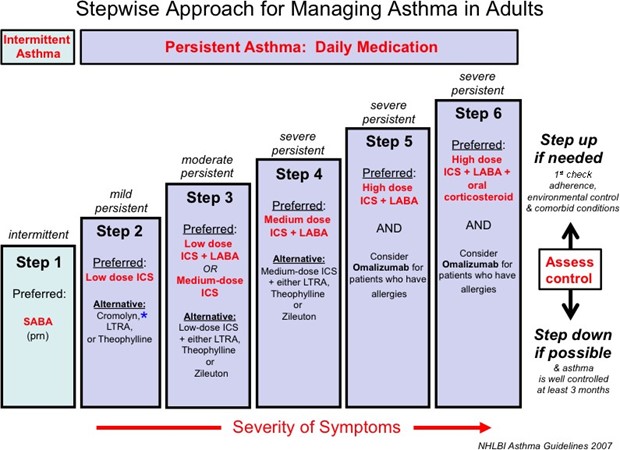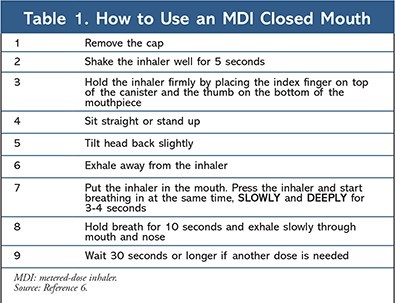A nurse is caring for a child who has asthma and a prescription for montelukast granules. Which of the following instructions should the nurse provide the client's parent on administering the medication?
Administer the granules mixed with 20 oz of water.
Administer the medication 2 hr before exercise.
Give the medication in the morning daily
Give the medication at the onset of wheezing
The Correct Answer is B
A. Administering the granules mixed with 20 oz of water is not necessary. Montelukast granules can be administered directly into the mouth or mixed with a small amount of soft food (e.g., applesauce) if necessary. The specific instructions for administration should be provided by the healthcare provider or included in the product labeling.
B. If you’re using it to prevent breathing problems related to exercise, take a single dose at least 2 hours before exercising. However, another dose cannot be taken within 24 hours.
C. Montelukast is a leukotriene receptor antagonist commonly used for the maintenance treatment of asthma in children and adults. The usual recommended dose is once daily in the evening, depending on the specific instructions from the healthcare provider.
D. Administering the medication at the onset of wheezing is not the recommended approach. Montelukast is a daily maintenance medication for asthma and should be taken regularly as prescribed, regardless of wheezing symptoms. It is not intended to be used for immediate relief of wheezing or acute asthma symptoms. Short-acting bronchodilators are typically used for quick relief of wheezing or acute asthma symptoms.
Nursing Test Bank
Naxlex Comprehensive Predictor Exams
Related Questions
Correct Answer is A
Explanation
A. Albuterol is a bronchodilator that provides quick relief by relaxing the muscles around the airways, making it essential to use before a corticosteroid like beclomethasone, which reduces inflammation. Using albuterol first allows for better delivery of the beclomethasone to the airways.
B. I will use both medications immediately after exercising. Albuterol may be used as a rescue inhaler before exercise to prevent exercise-induced bronchospasm, but beclomethasone is a maintenance medication and should not be used immediately after exercising unless prescribed.
C. "If my breathing begins to feel tight, I will use the beclomethasone inhaler immediately.” Beclomethasone is a long-term control medication, not a rescue inhaler. If breathing feels tight or there is an asthma attack, the client should use the albuterol inhaler for immediate relief.
D. I will administer the medications 10 minutes apart.While there is no strict rule about the timing between inhaler uses, the albuterol should be used first to open the airways, and while waiting a few minutes is acceptable, the emphasis should be on using albuterol before beclomethasone rather than a specific time frame.

Correct Answer is C
Explanation
When using an albuterol inhaler, it is important for the client to take a slow and deep inhalation while releasing the medication from the inhaler. After inhaling the medication, holding the breath for about 10 seconds allows the medication to reach deep into the airways and maximize its effectiveness.
The other actions mentioned are not correct:
A. Waiting 10 minutes between inhalations: Albuterol inhalers are typically used as a quick-relief medication for acute symptoms, and waiting 10 minutes between inhalations may not provide immediate relief when needed. The specific instructions on the frequency of inhalations should be provided by the healthcare provider.
B. Taking a quick inhalation while releasing the medication from the inhaler: It is important to take a slow and deep inhalation while releasing the medication to ensure that the medication reaches the lungs effectively. Taking a quick inhalation may result in less effective delivery of the medication.
D. Exhaling as the medication is released from the inhaler: It is important to exhale fully before using the inhaler to ensure that the medication is inhaled deeply into the lungs. Exhaling while releasing the medication can interfere with the proper inhalation technique.

Whether you are a student looking to ace your exams or a practicing nurse seeking to enhance your expertise , our nursing education contents will empower you with the confidence and competence to make a difference in the lives of patients and become a respected leader in the healthcare field.
Visit Naxlex, invest in your future and unlock endless possibilities with our unparalleled nursing education contents today
Report Wrong Answer on the Current Question
Do you disagree with the answer? If yes, what is your expected answer? Explain.
Kindly be descriptive with the issue you are facing.
